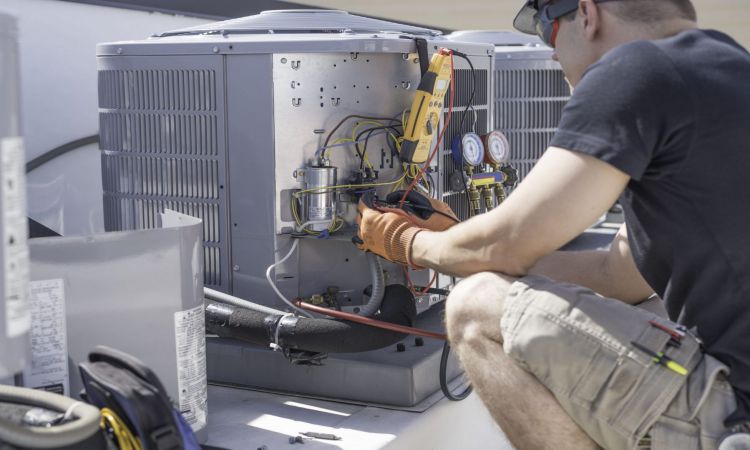 A functioning air conditioner is critical for home comfort during the summer months. Depending on where you live, the temperatures inside of your home could reach dangerous levels without a proper air conditioning system. When your system isn’t working correctly, it can be very uncomfortable. One of the most frustrating things that can happen is when your AC gets too cold and freezes up.
A functioning air conditioner is critical for home comfort during the summer months. Depending on where you live, the temperatures inside of your home could reach dangerous levels without a proper air conditioning system. When your system isn’t working correctly, it can be very uncomfortable. One of the most frustrating things that can happen is when your AC gets too cold and freezes up.
So, what causes ice on air conditioner? Numerous problems, from poor airflow to broken components to low refrigerant levels, could cause ice to form on the unit. Let’s take a closer look at the problems that could lead to a frozen AC unit.
Poor Airflow
One of the essential parts of your air conditioning unit is the evaporator coil. The evaporator coil is the final stop in the air cooling process of your home’s air conditioning system. Your air conditioner works by expanding the refrigerant inside of the evaporator coil so that it cools down. The refrigerant is converted from gas to liquid and back again very quickly. When the refrigerant is sent to the evaporator coil, it is converted to gas and cools the indoor coil. Your blower fan moves air across the coil, absorbing heat and humidity and cooling the air.
When the system works correctly, adequate airflow prevents the cooled evaporator coil from freezing up. But, if there is little or no air flowing over the coil, it will get colder and frost over because it isn’t absorbing heat. When your evaporator coil is covered in ice, it can’t adequately cool your home. Reduced airflow could result from dirty coils or a dirty air filter that obstructs air coming into the unit. It is important to change your air filters regularly and schedule regular annual HVAC service to have the unit cleaned.
Low Refrigerant
Refrigerant is like the blood that flows through your AC system and keeps it functioning. As discussed, the refrigerant changes between gas and liquid as it travels through your AC to cool the air. If any of the components in your AC system develop a leak, the refrigerant in your system could seep out over time. A low refrigerant level could create a few problems in your system.
Low refrigerant levels are the most common cause of ice on your air conditioner. When your AC system is low on refrigerant, the pressure drops and causes the evaporator coil to cool abnormally. As a result, returning air delivers humidity and moisture across the coils, and it freezes up quickly. This continues until the coil is covered in ice. You will need a professional HVAC technician to find the leak and repair the issue. Once the technician solves the problem, they can add more refrigerant, and the unit will function properly again.
Broken Components
 Aside from the common causes of poor airflow and low refrigerant, the problem could also be due to worn or broken components. In general, your AC unit should last around 20 years. Over the course of normal AC system operation, wear and tear could cause problems with internal components. There are several potential issues that could develop from faulty wiring and blocked drains, such as a faulty blower motor or a cracked refrigerant line. Any of these issues could result in excess ice forming on your air conditioner.
Aside from the common causes of poor airflow and low refrigerant, the problem could also be due to worn or broken components. In general, your AC unit should last around 20 years. Over the course of normal AC system operation, wear and tear could cause problems with internal components. There are several potential issues that could develop from faulty wiring and blocked drains, such as a faulty blower motor or a cracked refrigerant line. Any of these issues could result in excess ice forming on your air conditioner.
It is important that you contact a qualified HVAC technician to inspect your unit if you suspect broken components. A professional technician will identify the problem and repair or replace the component. Without proper service, the unit will continue to freeze up and prevent cold air from entering your home.
If you notice that ice has formed on your AC unit, you should turn it off immediately and let it thaw out. Aside from checking your air filters and vents, you will need to call a service technician to evaluate the issue and offer solutions.











